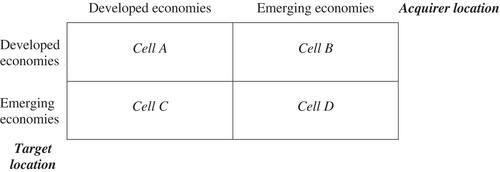Theorizing about emerging multinationals' cross-border acquisitions
Abstract
Research Summary
The emergence of multinational enterprises from emerging economies (emerging multinationals or EMNEs) has resulted in two puzzles: (1) Why do EMNEs often bid higher for targets in developed economies? (2) Why do EMNEs often allow such targets significant autonomy? From a theoretical standpoint, the two puzzles beg the question of whether an integrative answer exists. Extending property rights theory, we conceptualize an EMNE as a collection of assets over which an emerging-economy firm has residual control, gained predominantly through cross-border acquisitions. Leveraging a legitimacy-based view, we suggest that EMNEs suffer from legitimacy deficits. Overall, the key to theorizing about EMNEs' cross-border acquisitions and solving the two puzzles is to appreciate EMNEs' endeavors to simultaneously maximize joint value creation, minimize target incentive loss, and overcome legitimacy deficits.
Managerial Summary
Driven by property rights thinking and legitimacy deficits considerations, multinational enterprises from emerging economies (emerging multinationals or EMNEs) often pay higher premiums for and grant significant autonomy to acquisition targets in developed economies. During the pre-acquisition phase, EMNEs need to carefully evaluate targets' value-creation potential and asset complementarity. During the post-acquisition phase, offering autonomy to targets is advisable, if acquisition premiums are high, if pursued assets are knowledge-based, and if target managers and employees as well as other stakeholders (such as host-country governments) have raised major concerns. Although few EMNEs explicitly refer to research on property rights and legitimacy deficits, many of them have acted in a way that is consistent with such theoretical reasoning. Emerging-economy acquirers that follow such reasoning often perform well.



 求助内容:
求助内容: 应助结果提醒方式:
应助结果提醒方式:


